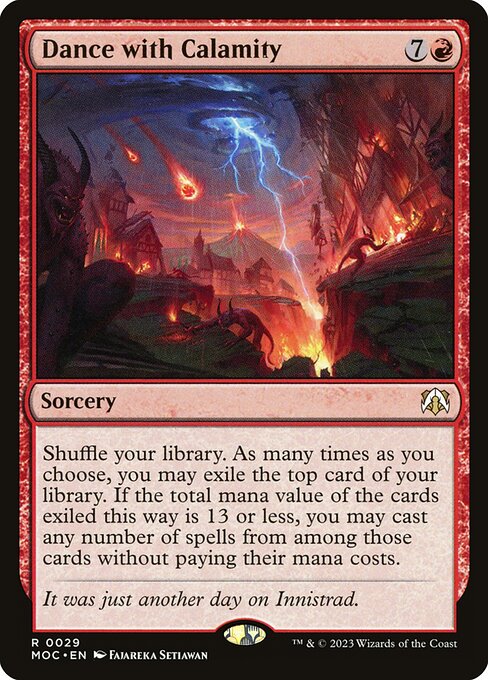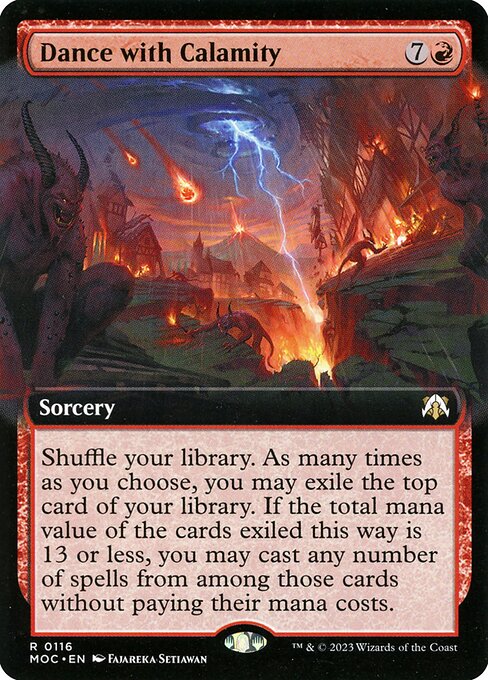standard
future
historic
gladiator
pioneer
explorer
modern
legacy
pauper
vintage
penny
commander
brawl
alchemy
paupercommander
duel
oldschool
premodern
Rulings
Any cards not cast, including land cards, remain in exile. They can’t be cast on later turns.
If you cast a card “without paying its mana cost,” you can’t pay any alternative costs. You can, however, pay additional costs. If the card has any mandatory additional costs, those must be paid to cast the card.
If you danced with calamity a little too closely, and the total mana value of the exiled cards is greater than 13, the cards you exiled will remain there and you won’t get to cast any of them.
If you cast more than one of the exiled cards, you choose the order in which to cast them. A spell you cast this way can be the target of a later spell you cast this way. However, permanent spells cast this way won’t resolve until you’re done casting spells, so the permanents they become can’t be the target of spells cast this way. For example, if you exile Twincast and Lightning Strike, you can cast Lightning Strike and then cast Twincast targeting it; but if you exile a creature card and an Aura card, you can’t cast that Aura targeting that creature.
You can look at each card you exile before deciding whether to push your luck or stop.
If an exiled card has in its mana cost, you must choose 0 as the value of X when casting it without paying its mana cost.
If you cast any of the exiled cards, you do so as part of the resolution of the spell. You can’t wait to cast them later in the turn. Timing restrictions based on a card’s type are ignored.
If you cast a card “without paying its mana cost,” you can’t pay any alternative costs. You can, however, pay additional costs. If the card has any mandatory additional costs, those must be paid to cast the card.
If you danced with calamity a little too closely, and the total mana value of the exiled cards is greater than 13, the cards you exiled will remain there and you won’t get to cast any of them.
If you cast more than one of the exiled cards, you choose the order in which to cast them. A spell you cast this way can be the target of a later spell you cast this way. However, permanent spells cast this way won’t resolve until you’re done casting spells, so the permanents they become can’t be the target of spells cast this way. For example, if you exile Twincast and Lightning Strike, you can cast Lightning Strike and then cast Twincast targeting it; but if you exile a creature card and an Aura card, you can’t cast that Aura targeting that creature.
You can look at each card you exile before deciding whether to push your luck or stop.
If an exiled card has in its mana cost, you must choose 0 as the value of X when casting it without paying its mana cost.
If you cast any of the exiled cards, you do so as part of the resolution of the spell. You can’t wait to cast them later in the turn. Timing restrictions based on a card’s type are ignored.
Rulings
Any cards not cast, including land cards, remain in exile. They can’t be cast on later turns.
If you cast a card “without paying its mana cost,” you can’t pay any alternative costs. You can, however, pay additional costs. If the card has any mandatory additional costs, those must be paid to cast the card.
If you danced with calamity a little too closely, and the total mana value of the exiled cards is greater than 13, the cards you exiled will remain there and you won’t get to cast any of them.
If you cast more than one of the exiled cards, you choose the order in which to cast them. A spell you cast this way can be the target of a later spell you cast this way. However, permanent spells cast this way won’t resolve until you’re done casting spells, so the permanents they become can’t be the target of spells cast this way. For example, if you exile Twincast and Lightning Strike, you can cast Lightning Strike and then cast Twincast targeting it; but if you exile a creature card and an Aura card, you can’t cast that Aura targeting that creature.
You can look at each card you exile before deciding whether to push your luck or stop.
If an exiled card has in its mana cost, you must choose 0 as the value of X when casting it without paying its mana cost.
If you cast any of the exiled cards, you do so as part of the resolution of the spell. You can’t wait to cast them later in the turn. Timing restrictions based on a card’s type are ignored.
If you cast a card “without paying its mana cost,” you can’t pay any alternative costs. You can, however, pay additional costs. If the card has any mandatory additional costs, those must be paid to cast the card.
If you danced with calamity a little too closely, and the total mana value of the exiled cards is greater than 13, the cards you exiled will remain there and you won’t get to cast any of them.
If you cast more than one of the exiled cards, you choose the order in which to cast them. A spell you cast this way can be the target of a later spell you cast this way. However, permanent spells cast this way won’t resolve until you’re done casting spells, so the permanents they become can’t be the target of spells cast this way. For example, if you exile Twincast and Lightning Strike, you can cast Lightning Strike and then cast Twincast targeting it; but if you exile a creature card and an Aura card, you can’t cast that Aura targeting that creature.
You can look at each card you exile before deciding whether to push your luck or stop.
If an exiled card has in its mana cost, you must choose 0 as the value of X when casting it without paying its mana cost.
If you cast any of the exiled cards, you do so as part of the resolution of the spell. You can’t wait to cast them later in the turn. Timing restrictions based on a card’s type are ignored.
Your collection? Your decks?
Want to manage your collection and/or create decks?



 0
0
 2.02€
2.02€